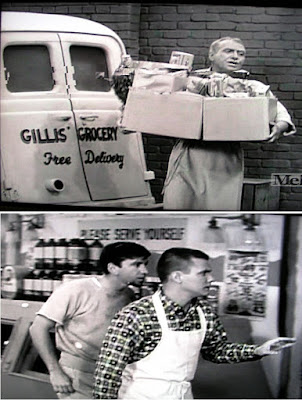PHOTO: The then common, free delivery of groceries is depicted in 1961 by the popular TV character Herbert T. Gillis (top) carrying out groceries to his delivery van, which he had recently loaned out to his son Dobbie Gillis (bottom right) and friend Maynard G. Krebs (bottom left). Smaller grocers continued to deliver groceries, as a way to compete with the self-service supermarkets that became popular after World War II, in addition to welcoming customers with signs saying, "Please serve yourself" (bottom photo). It didn't work and the stores that did not go out of business morphed into being small, convenience stores selling gasoline, lottery tickets, snacks, etc. Unknown to Dobbie's father, inside his grocery delivery truck was a lost lion, which prompted the title for this episode, a parody of the TV game show "What's My Line? (1950)." The objective of this TV game show was for the panelists to guess the line of work or occupation of an ordinary guest, and when blindfolded the identity of a celebrity guest. (See "The Many Loves of Dobie Gillis - What's My Lion?" (1961) release Date: January 10, 1961 (watched 12/27/2015 on free over-the-air broadcast TV channel KEZI-TV 9.2 and Comcast cable Channel 309)) and also see The Many Loves of Dobie Gillis (season 2) See wikipedia.org)
The classic TV sitcom "The Many Loves of Dobie Gillis" included a historically important lesbian, gay, butch tomboy character named Zelda Gilroy, who plays the wannabe girlfriend of the title character. The character Zelda was played by the child actress Sheila Kuehl (See wikipedia.org) who would later move on to get a Harvard Law School degree and become the first openly gay person elected to the California legislature. Although she played an overtly heterosexual character, chasing after a boy, many people considered her to be too "butch" to play that role in a proposed spinoff show featuring her and Dobie. Back then, being butch caused most people to assume a woman was a lesbian dyke and in that era, any hint of homosexuality would blacklist any actor or actress except for the few roles where gender bending was considered normal.
Speaking of grocery delivery, the small Colorado town, where my Grandmother lived, had a small grocery store whose owner delivered groceries to her until the day she died. She was too blind and crippled to drive a car and shop at the big supermarkets that were built in nearby towns in the 1950's that took over most grovery sales. She was grateful for the grocery delivery service, which I assume vanished after the store owner retired.
When I saw Dobbie's father delivering groceries, it made me recall how grocery delivery was a common service years ago, and there are signs it might be coming back in the internet and smartphone age.
For example, Wal-Mart recently built a store in Corvallis to sell only groceries, and it seems like it was built mostly to be a perfect distribution point for delivering groceries to city residents because it is configured unlike typical grocery stores. It is hidden off the street, like a warehouse building, which makes me speculate that Wal-Mart plans to use this queer grocery store as a future distribution point for Wal-Mart groceries they sell customers online or via a smartphone. My speculation is further fueled further by a business magazine story by Phil Wahba, "Walmart testing new tools in e-commerce arms race with Amazon -- The world's largest retailer is testing out a free delivery service, as well as grocery pick up kiosks, as it looks for new ways to compete with Amazon," fortune.com posted Jun. 19, 2015. The article said, "Walmart has in recent years equipped more than 80 of its U.S. super centers to help fill online orders and speed up delivery. That's about the same number of distribution centers Amazon operates."
The existence of grocery delivery will be important to people who are unable to drive, due to age or medical reasons, because it will free their dependence on family or church members to buy food and deliver it to them. It looks like Walt-Mart and Amazon are rediscovering grocery delivery, which means there must be a market for this service that is bigger than just those who are unable to drive to a grocery store.
